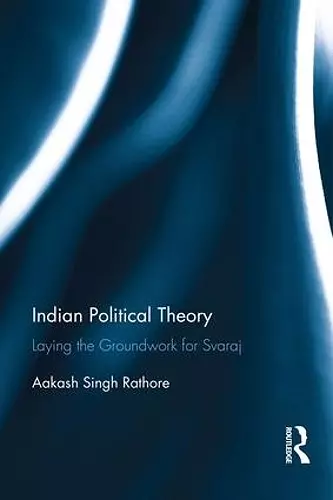Indian Political Theory
Laying the Groundwork for Svaraj
Aakash Singh Rathore author Aakash Singh Rathore editor
Format:Hardback
Publisher:Taylor & Francis Ltd
Published:24th Feb '17
Currently unavailable, and unfortunately no date known when it will be back
This hardback is available in another edition too:
- Paperback£41.99(9780367885458)

At present, a nativist turn in Indian political theory can be observed. There is a general assumption that the indigenous thought to which researchers are supposed to be (re)turning may somehow be immediately visible by ignoring the colonization of the mind and polity. In such a conception of svaraj (which can be translated as ‘authentic autonomy’), the tradition to be returned to would be that of the indigenous elites.
In this book, this concept of svaraj is defined as a thick conception, which links it with exclusivist notions of spirituality, profound anti-modernity, exceptionalistic moralism, essentialistic nationalism and purism. However, post-independence India has borne witness to an alternative trajectory: a thin svaraj. The author puts forward a workable contemporary ideal of thin svaraj, i.e. political, and free of metaphysical commitment. The model proposed is inspired by B.R. Ambedkar's thoughts, as opposed to the thick conception found in the works of M.K. Gandhi, KC Bhattacharya and Ramachandra Gandhi. The author argues that political theorists of Indian politics continue to work with categories and concepts alien to the lived social and political experiences of India's common man, or everyday people. Consequently, he emphasises the need to decolonize Indian political theory, and rescue it from the grip of western theories, and fascination with western modes of historical analysis. The necessity to avoid both universalism and relativism and more importantly address the political predicaments of ‘the people’ is the key objective of the book, and a push for a reorientation of Indian political theory.
An interesting new interpretation of a contemporary ideal of svaraj, this analysis takes into account influences from other cultures and sources as well as eschews thick conceptions that stifle imaginations and imaginaries. This book will be of interest to academics in the fields of philosophy, political science, sociology, literature and cultural studies in general and contemporary political theory, South Asian and Indian politics and political theory in particular.
'Aakash Singh Rathore wrests the subject of political theory from the hands of self-centred and increasingly irrelevant Western thinkers and he democratizes it by anchoring it in the experience of the downtrodden masses of India: the Dalits. By re-reading Gandhi and Ambedkar, Professor Rathore rescues the concept of svaraj from Hindu nationalists and revives it to make it relevant to political theory - and to politics - today and in the future, in India and outside. This is a book of stunning ambition and great learning written in a style that is playful, confrontational and intellectually demanding. It should be read by all serious students of political theory, East and West.'
Torkel Brekke, Peace Research Institute Oslo (PRIO) and the University of Oslo, Norway.
'In this fascinating work Aakash Singh Rathore explores the many dimensions of the concept of Swaraj within the broader context of Political Theory, Indian Political Theory specifically. Rigorous revaluation of the concept enables him to reassess the long-standing debate between universalism and particularism while negotiating creatively between western-centric theory and the indigeneity he champions. It is a priceless read.'
Neera Chandhoke, Visiting Professorial Fellow, Centre for Law and Governance, Jawaharlal Nehru University, India.
'Indian Political Theory is a welcome volume as it seeks to introduce the reader to the theoretical possibility that remains hidden in the system of ideas developed by thinkers like Babasaheb Ambedkar. In a fundamental sense the volume performs a moral function: it defines the completeness of Indian political theory on ethical grounds, with the demand of an egalitarian accommodation of subaltern thought.'
Gopal Guru,Jawaharlal Nehru University, India
'Indian Political Theory does much more than provide a perfect cognitive mapping of what its title says. It serves as a compass that allows us to orient ourselves in the pandemonium of Indian politics, wisely avoiding both traps of imitating Western models or of advocating a naive return to some imagined Indian tradition. The book is indispensable for all who want to understand the deepest political motivations of a growing superpower.'
Slavoj Zizek, Birkbeck College, UK
'This impressive critique of the idea of svaraj in Indian political thought deserves to be widely read.'
Talal Asad,CUNY Graduate Institute, USA
'An excellent overview of contemporary critical political thought in India. A superb resource for students and serious readers.'
Partha Chatterjee, Columbia University, USA and Centre for Studies in Social Sciences, Calcutta, India
"Rathore acknowledges the efforts of a set of Indian scholars who have highlighted the inadequacies of dominant political theories. He bemoans that while the knowledge and experience of the West gets universal status, those of non-western politics, society, and culture are quickly prefixed and slotted in silos like 'Indian' or 'Chinese'."
K.K. Kailash, 'Giving Ourselves a Loud Voice,' Outlook India
ISBN: 9781138240223
Dimensions: unknown
Weight: 476g
222 pages